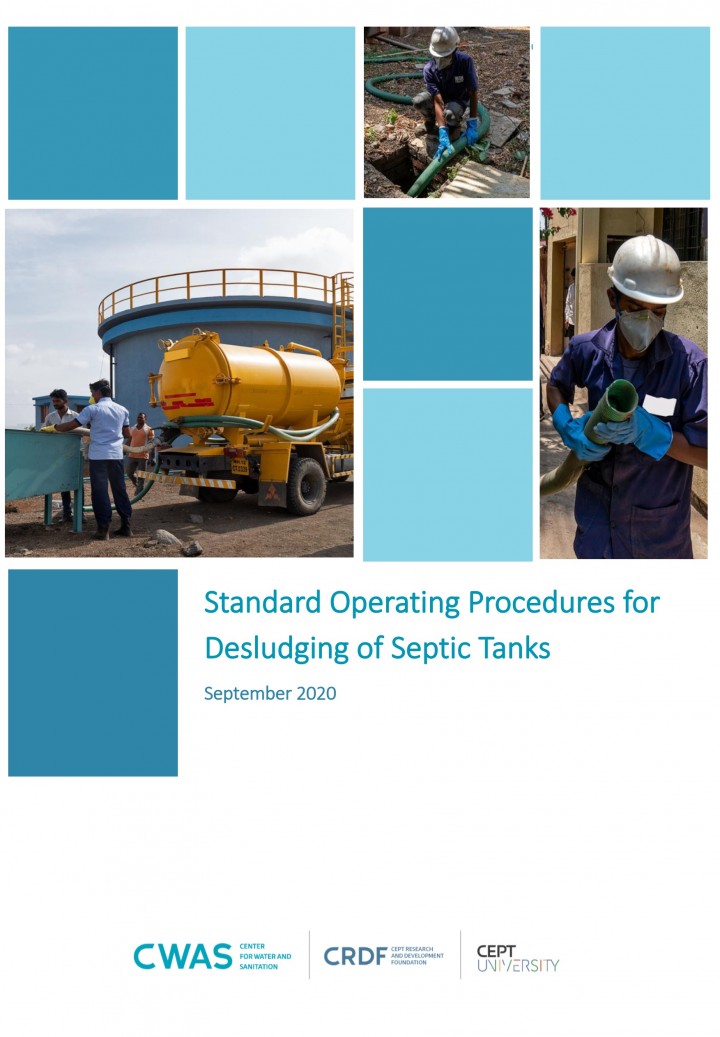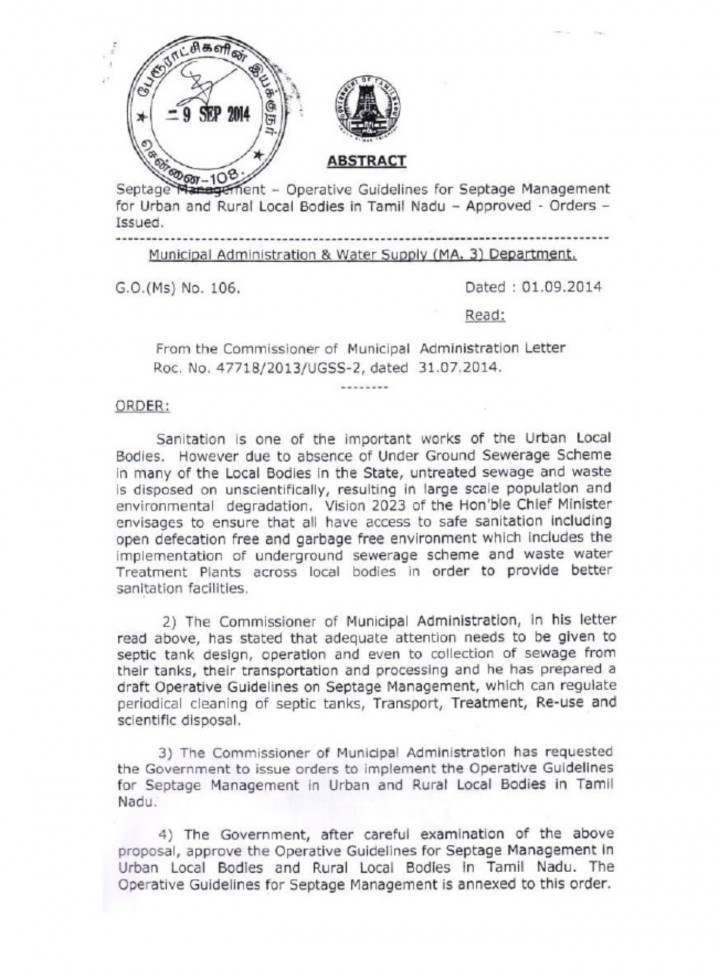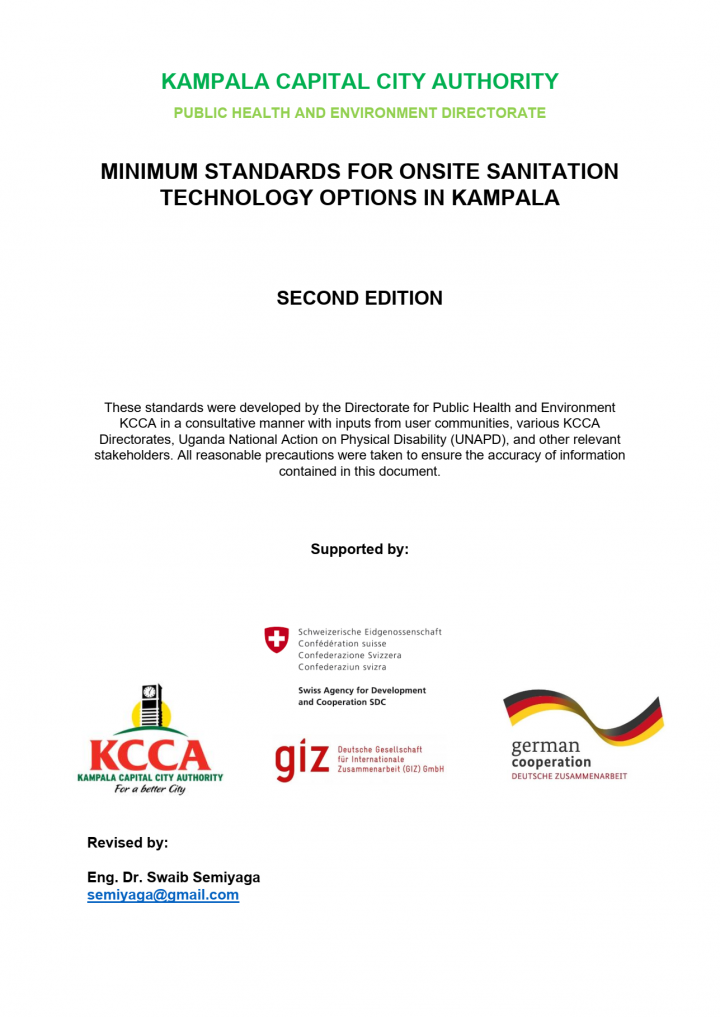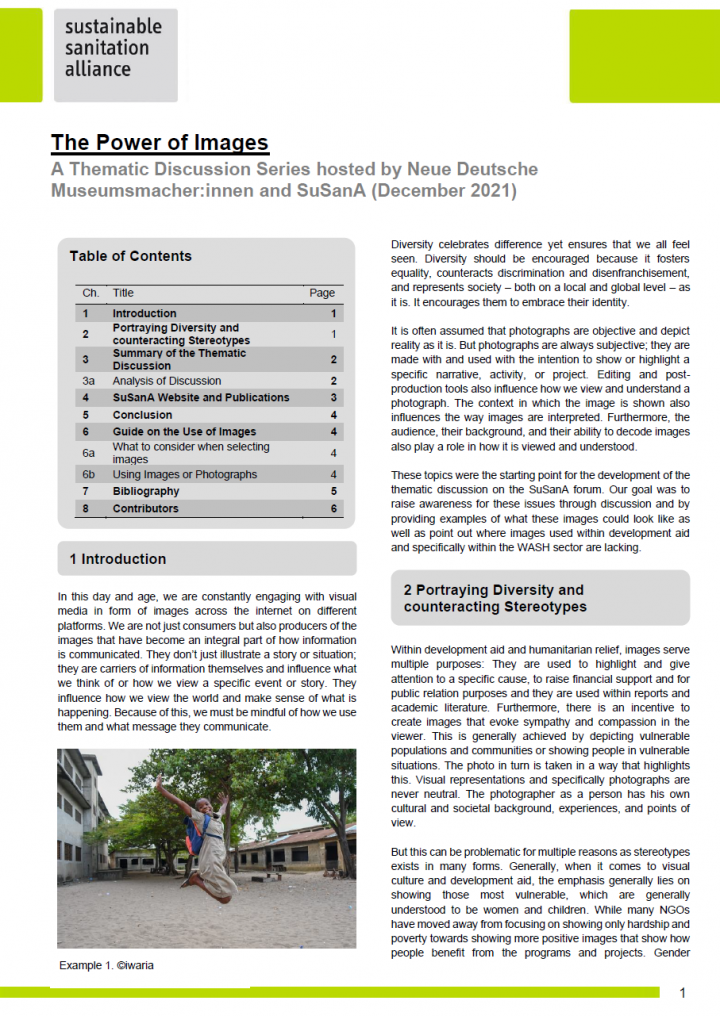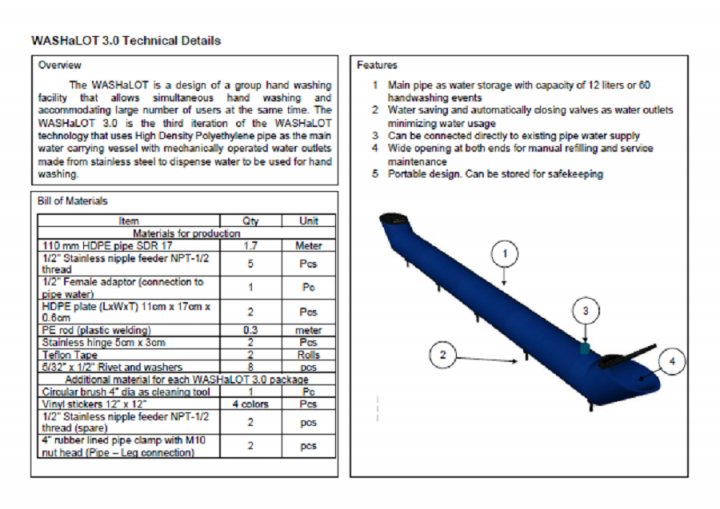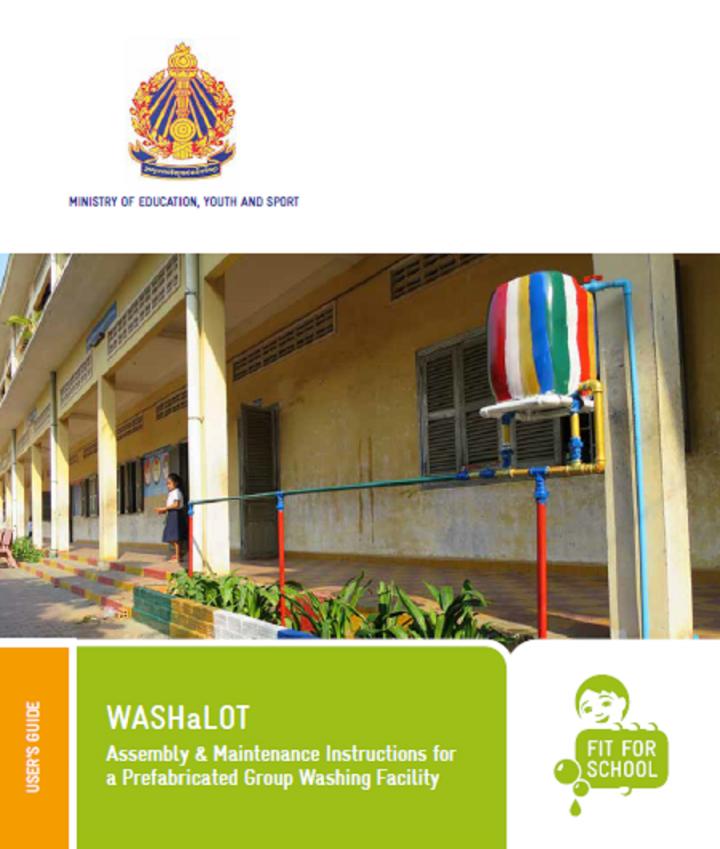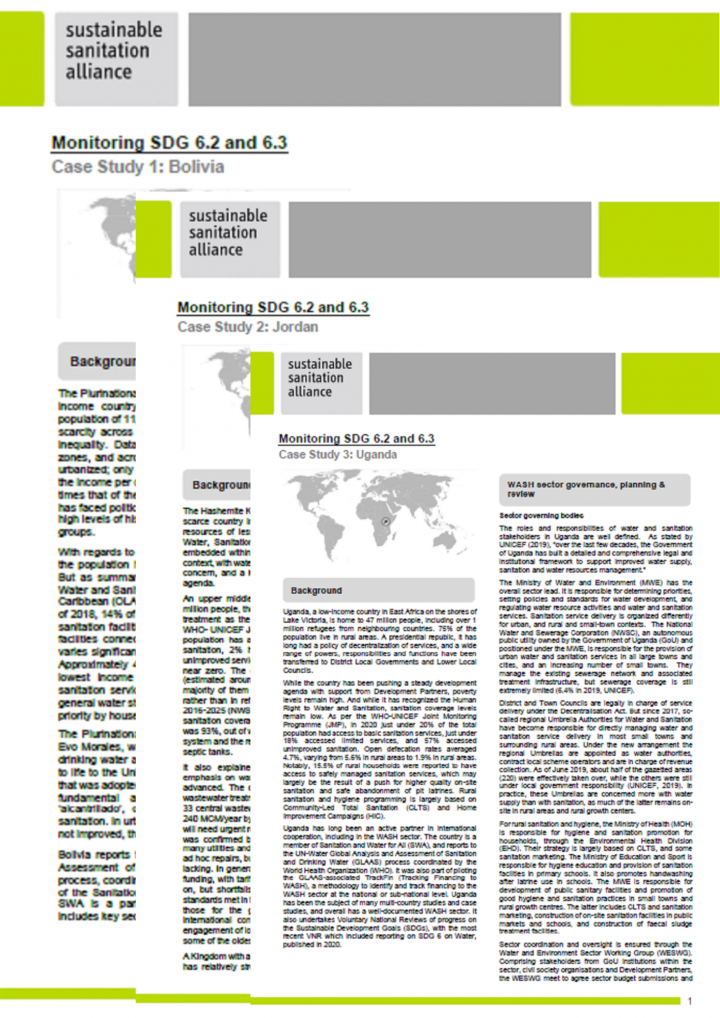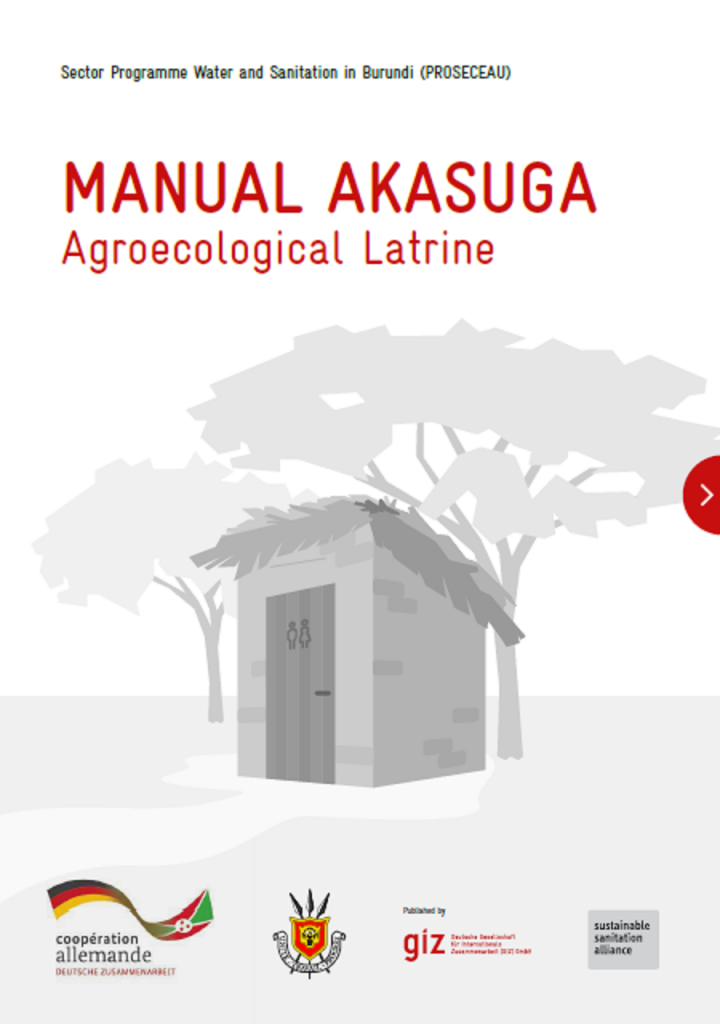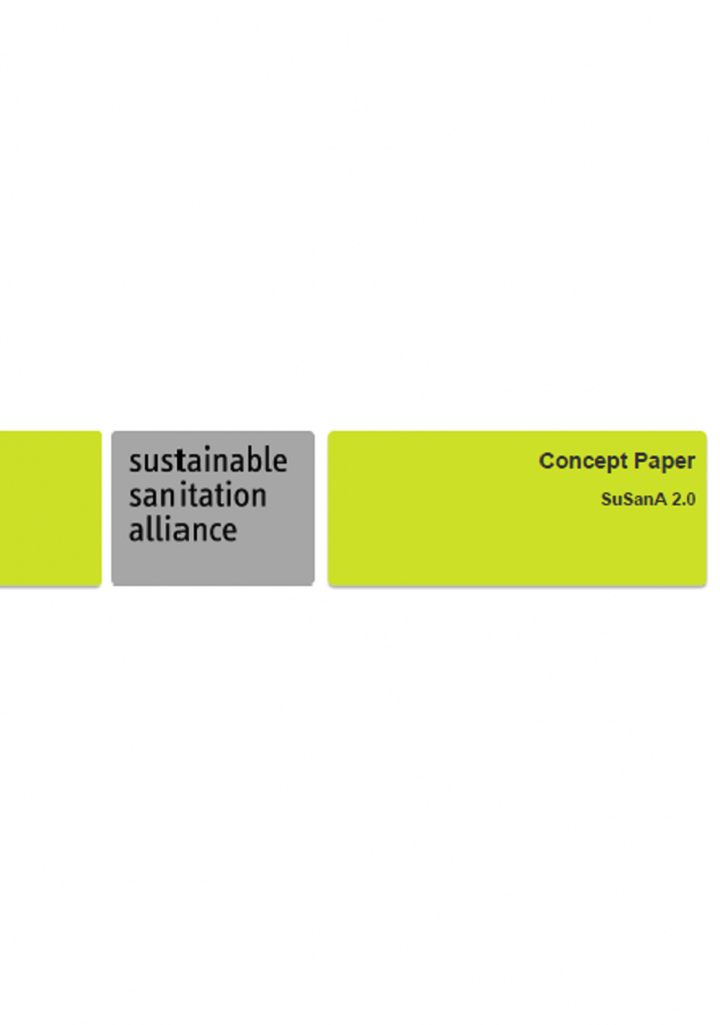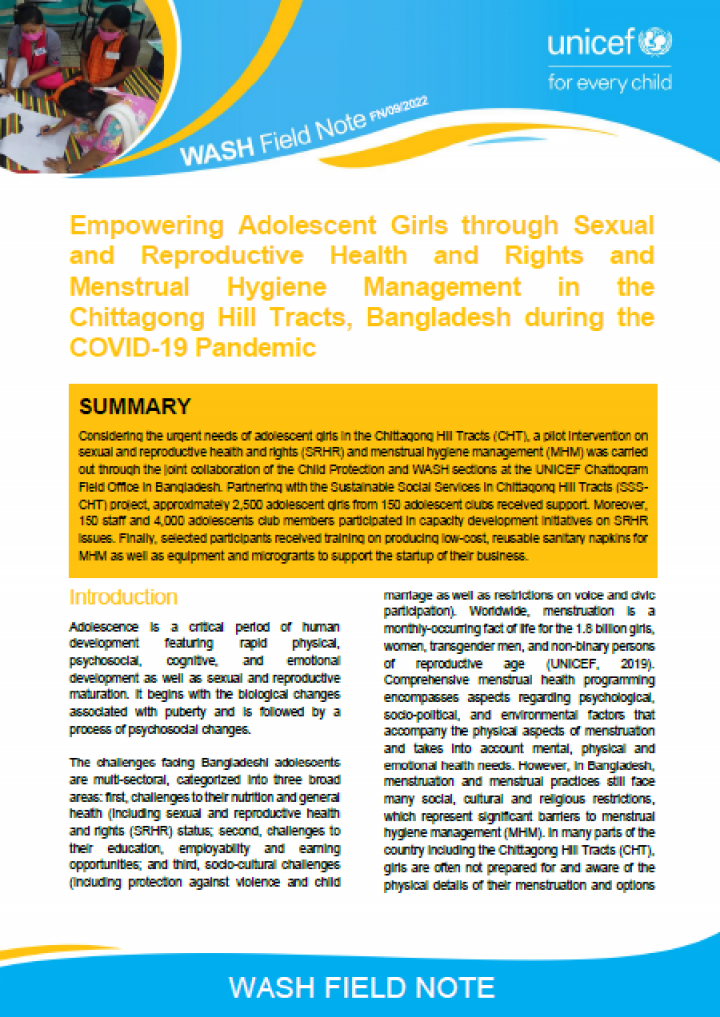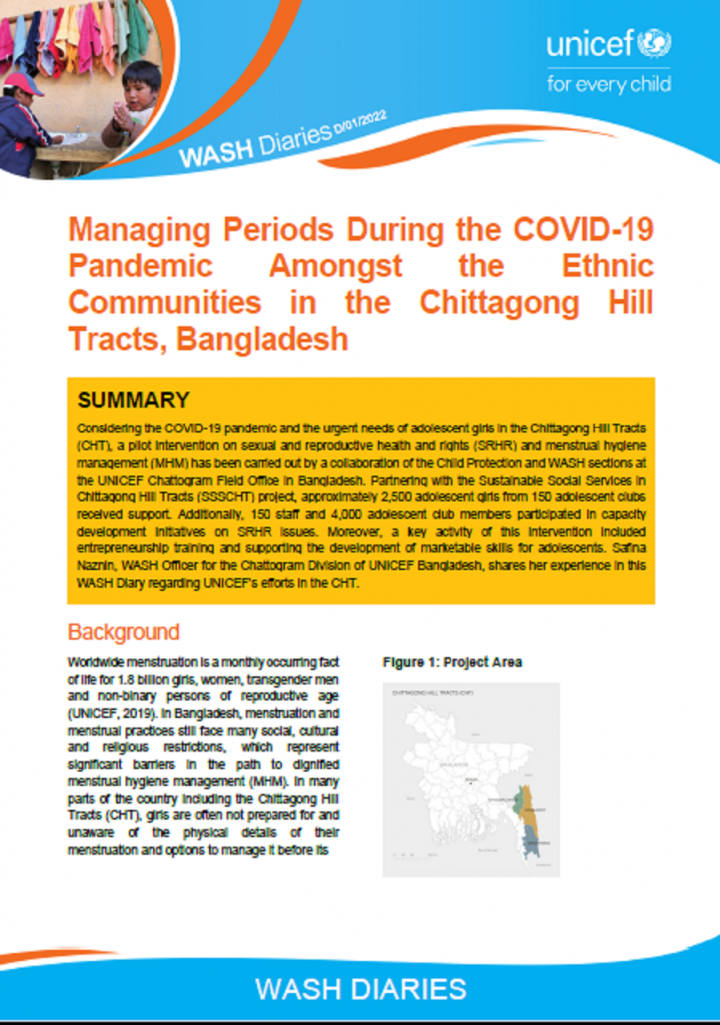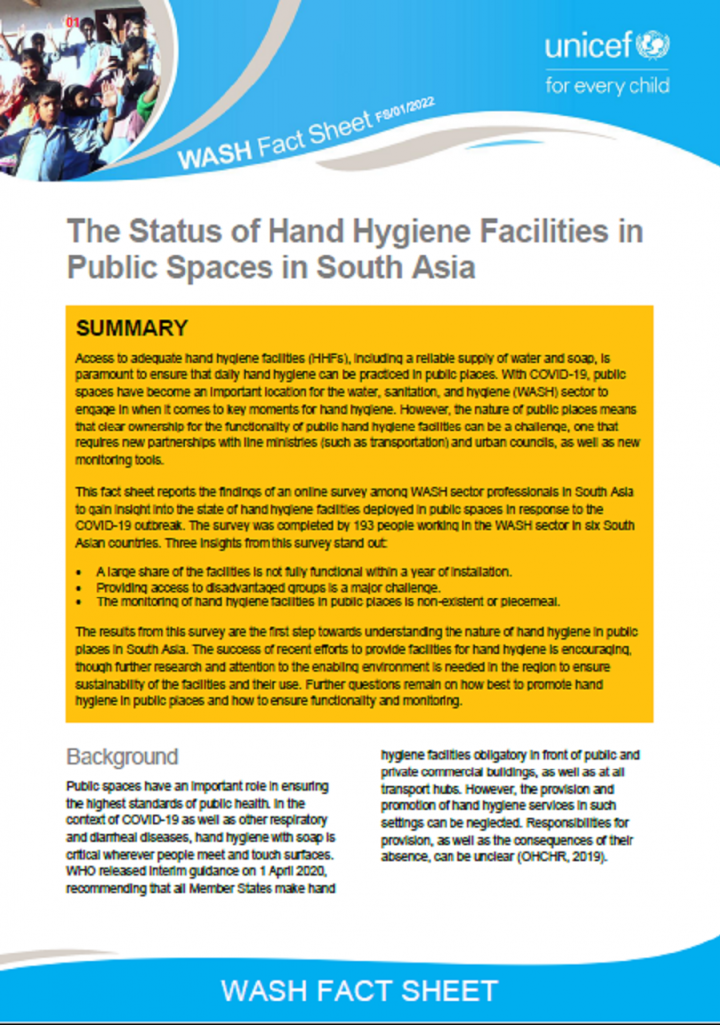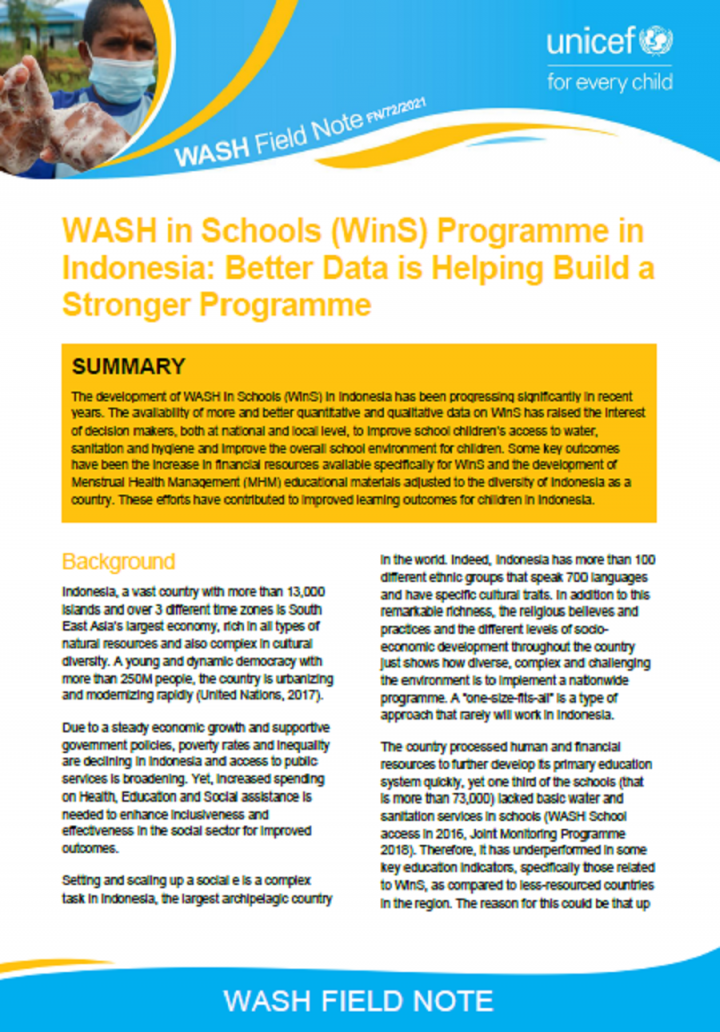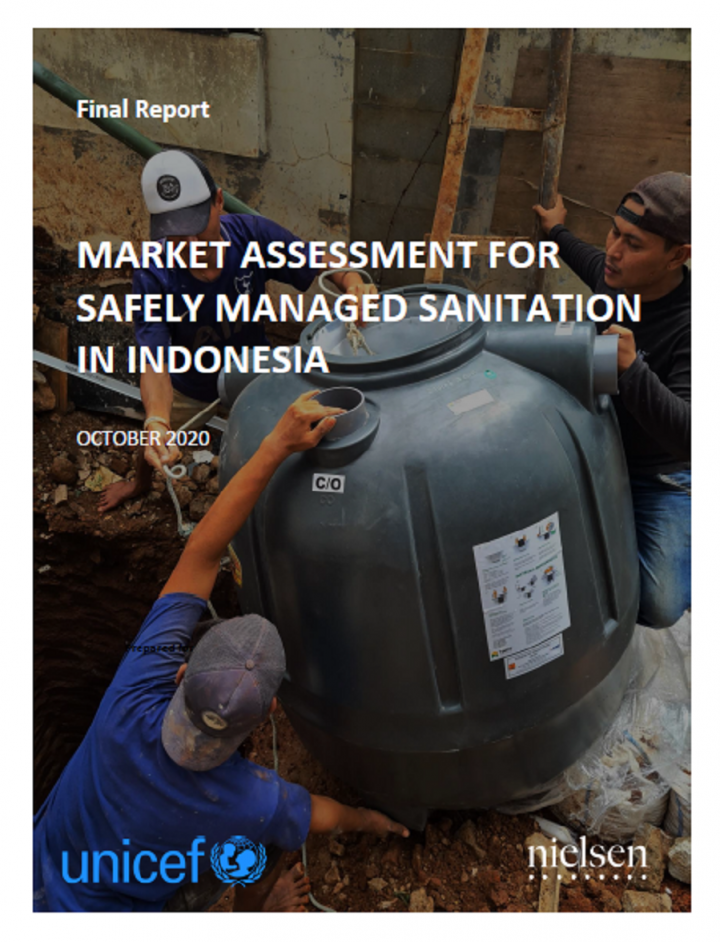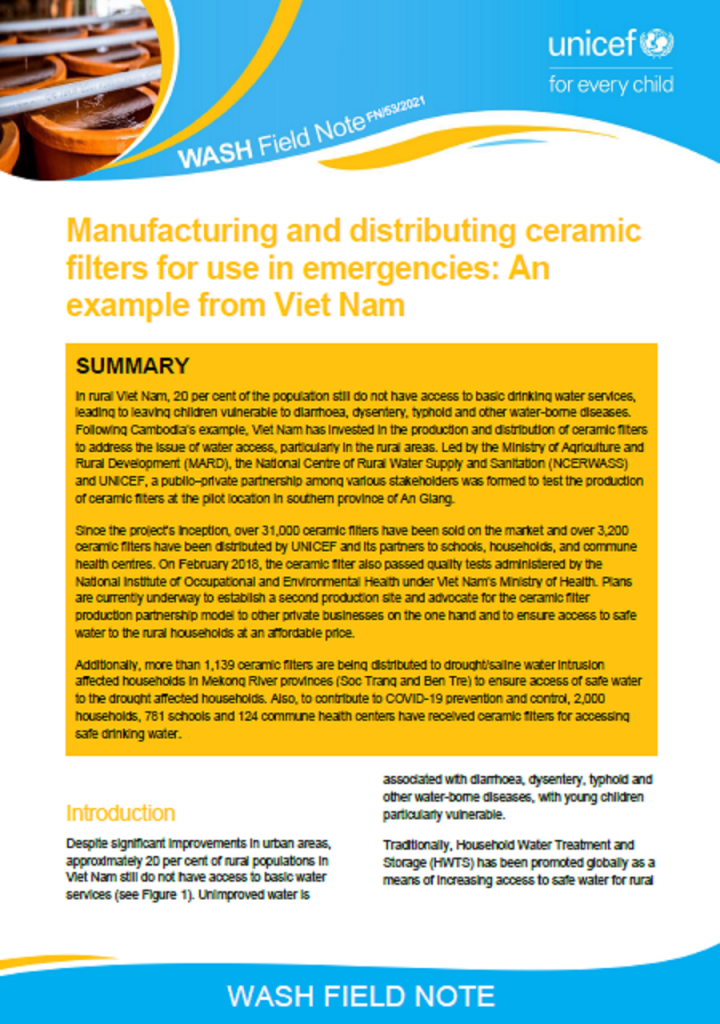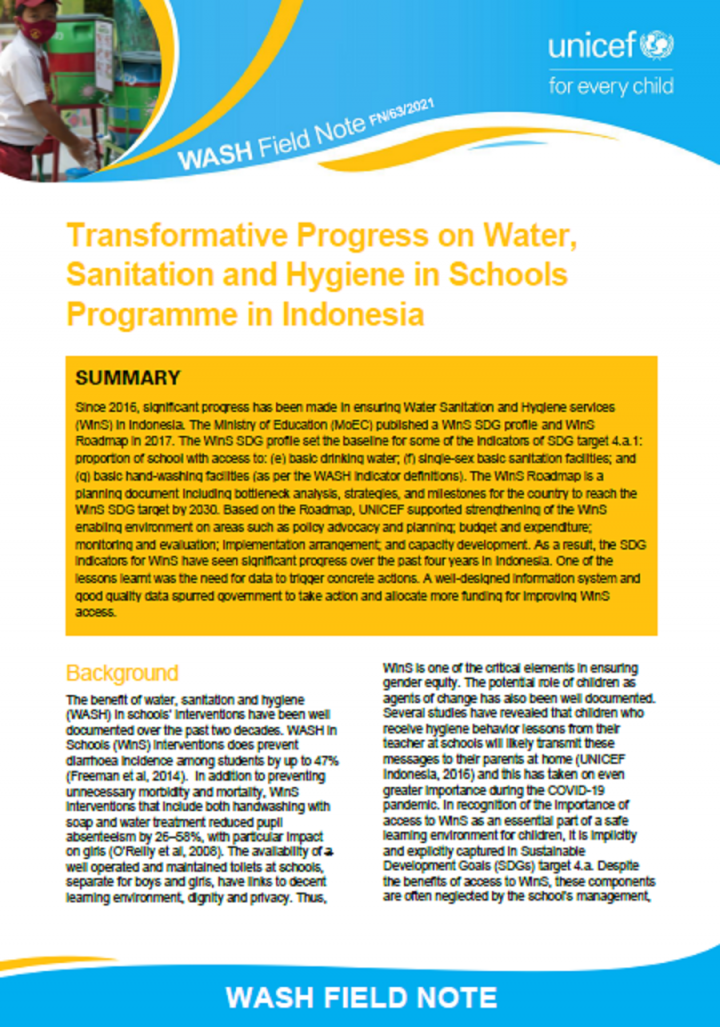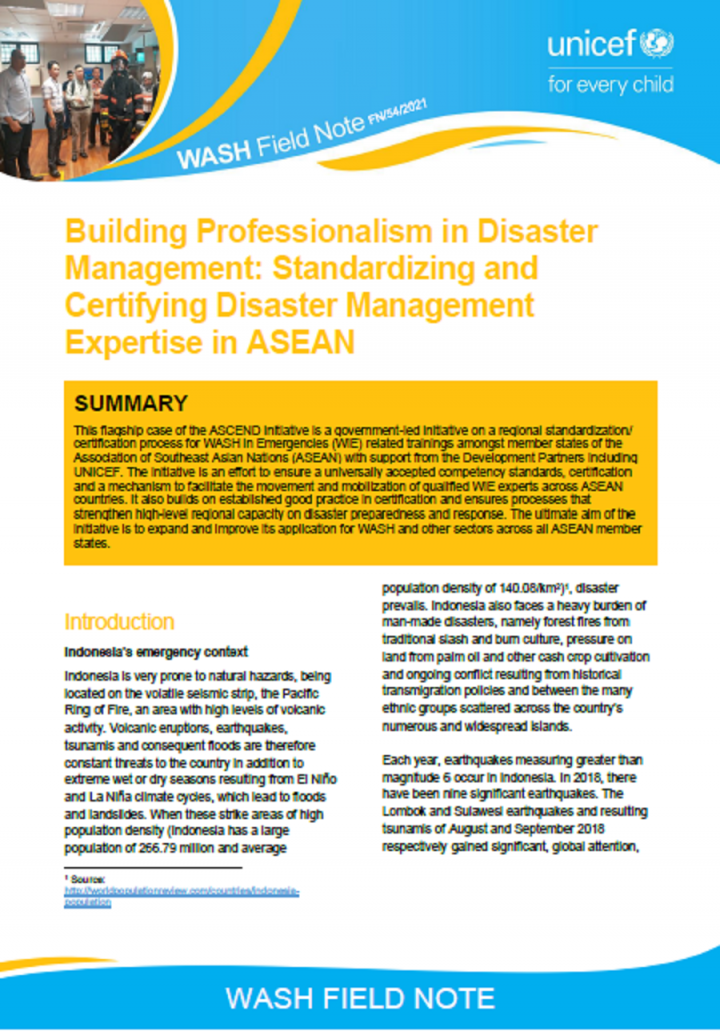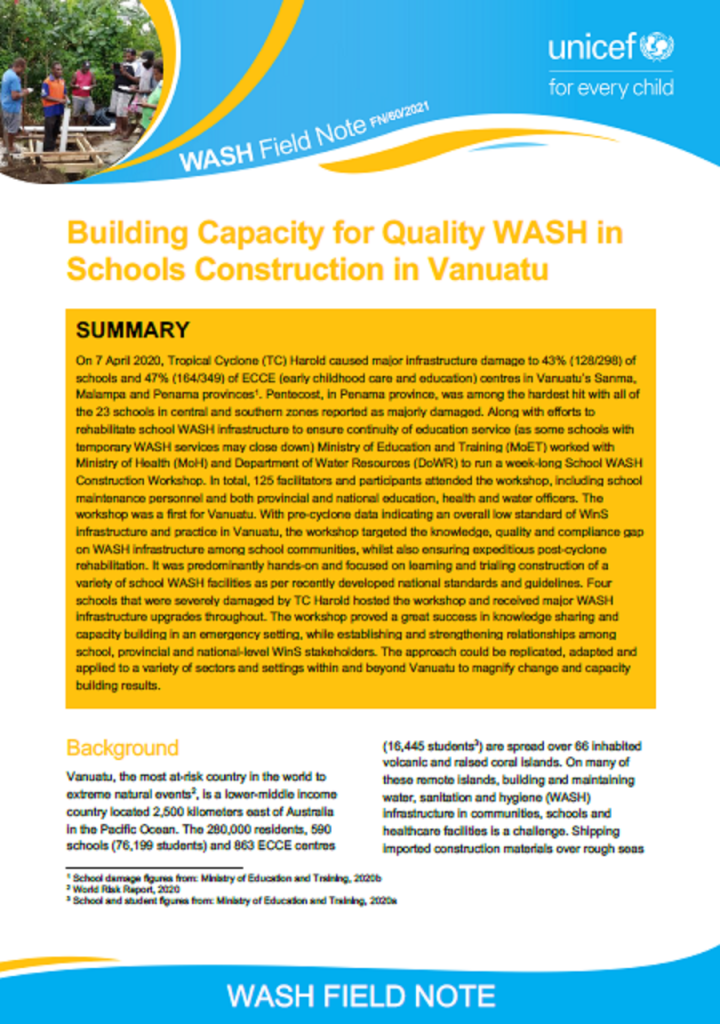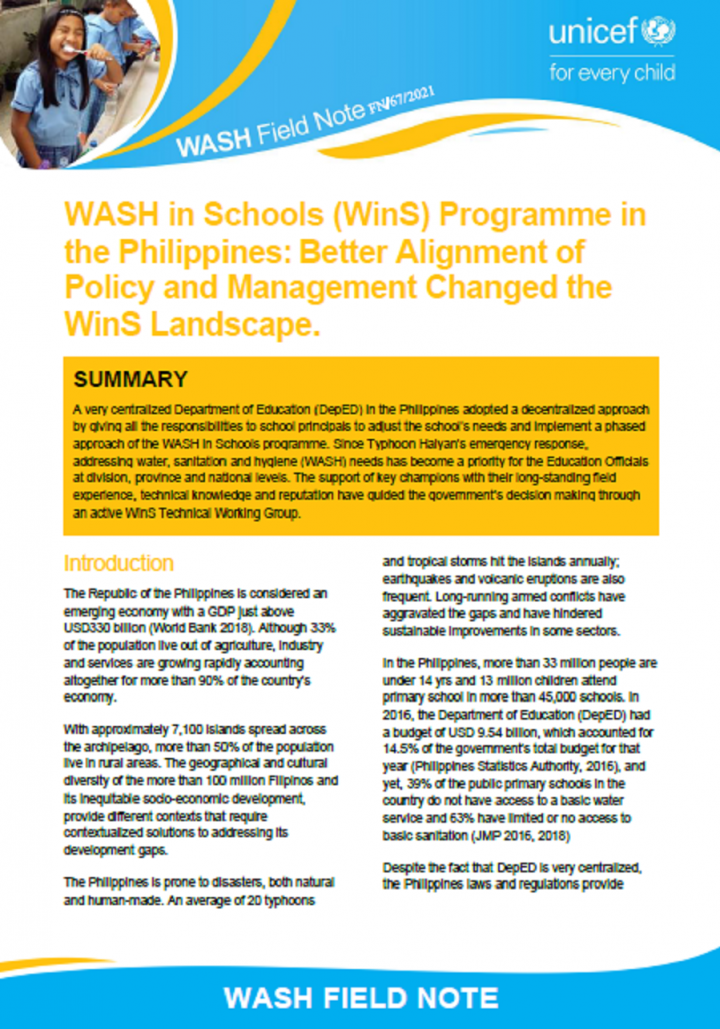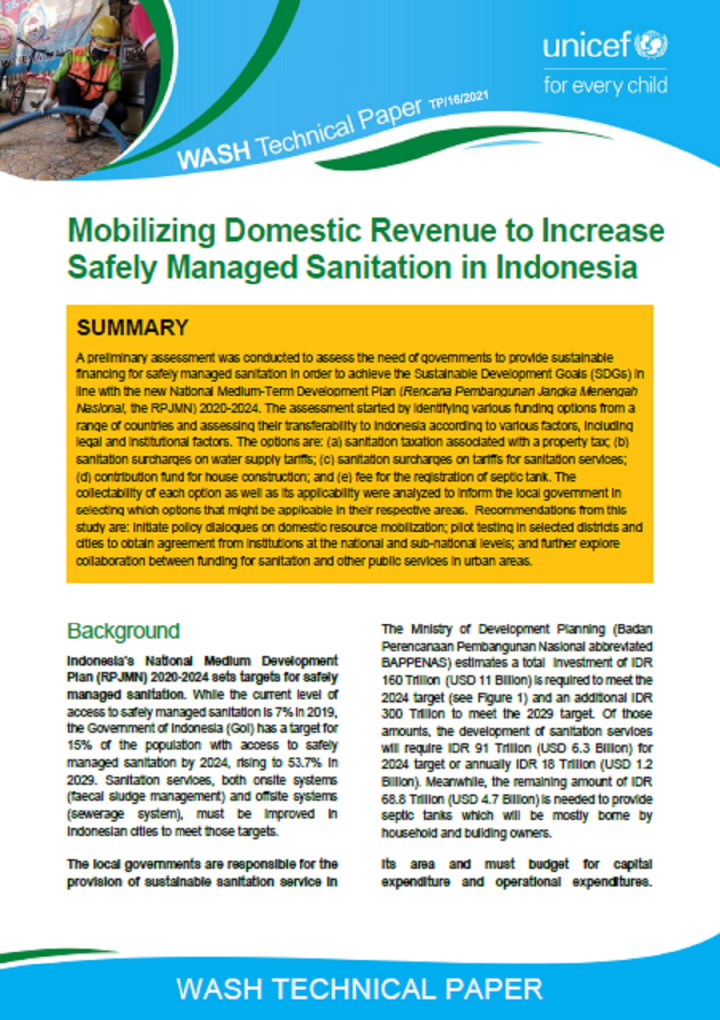Center for Water and Sanitation CRDF; CEPT University (2020) Standard Operating Procedures for Desludging of Septic Tanks
It is known that eradicating open defecation is only half the battle. For improving sanitation, faecal sludge and wastewater also needs to be safely managed. It is in this context that Government of India, Ministry of Housing and Urban Affairs (MoHUA) issued a National Faecal Sludge and Septage Management (FSSM) Policy3 . It recommends regular desludging of septic tanks through a systematic extraction and collection […]
Municipality Administration and Water Supply Department (2014) Operative Guidelines for Septage Management for urban and Local Rural bodies in Tamil Nadu
The partially treated sewage that is stored in a septic tank is commonly called as Septage. It includes the liquids, solids (sludge), as well as the fats, oils and grease (scum) that accumulate in septic tanks over time. Septage management includes the entire process of design, collection, safe treatment& disposal of septage based on generation of sewage. A comprehensive program that regulates periodic septic tank […]
Directorate for Public Health and Environment KCCA (0) Minimum Standards for Onsite Sanitation Technology Options in Kampala
Availability of adequate sanitation services is one of the most significant development challenges experienced in the rapidly growing Kampala city. Over 90% of Kampala’s population relies on on-site sanitation which include flush (pour and cistern) toilets, Urine Diversion Dehydrating Toilets (UDDTs), Ventilated Improved Pit Latrines (VIPs) and traditional pit latrines. The toilets are put up by individuals and different institutions with no proper guidance to inform […]
Neue Deutsche Museumsmacher:innen and SuSanA (2021) The Power of Images: A Thematic Discussion Series
Images are a big part of communication, today more so than ever. Not only do we consume more visual media than ever through social media and streaming sites. More and more we use images to communicate with each other, e.g. gifs and memes. Yet the way we read and understand an image is influenced by several factors including historical and cultural context or background, age […]
FIT FOR SCHOOL, OXYD (0) WASHaLOT 3.0 Technical Details
WASHaLOT 3.0 is a versatile design of a group handwashing facility that accommodates many users at the same time and a water-saving facility with automatically closing individual water outlets. To support the adaption of the WASHaLOT 3.0, documents are made available to the public to guide in the production process of the WASHaLOT 3.0.
FIT FOR SCHOOL (2015) WASHaLot User´s Guide Assembly & Maintenance Instructions for a Prefabricated Group Washing Facility
This users guide provides information on the installation, operation and maintenance of the WASHaLOT for schools and communities. It was produced jointly under a collaboration between MoEYS, GIZ and UNICEF in Cambodia.
C. van der Voorden (2022) Monitoring SDG targets 6.2 and 6.3 in Bolivia, Jordan and Uganda - brief case studies
In line with the expression ‘you manage what you measure’, high quality and regular monitoring is key for the successful achievement of SDG targets 6.2 and 6.3. SuSanA’s Vision Document states the intention to further its work to meet the increasing need for technical assistance in developing methodologies, designing monitoring structures compatible with existing technical and institutional capacities, and in implementing monitoring processes. As a […]
GIZ_ProSecEau (2021) Manual Akasuga Agroecological Latrine
The Akasuga technology is a low-cost agroecological latrine which has been developed and implemented by the GIZ Water and Sanitation Programme in Burundi (ProSecEau) in cooperation with the respective directions of the Ministry of Health and Ministry of Hydraulics responsible of Sanitation. ProSecEau has also developed in December 2021 an e-training (in English and French) on the Atingi.org platform. The e-training is a “training of […]
CMTF (2022) Concept Paper SuSanA 2.0
Since its foundation in 2007, SuSanA has grown to become a very large, and at times influential, network of organisations and individuals on sustainable sanitation. Its growth has contributed to challenges related to its model of structure, governance and operations, and the Bill and Melinda Gates Foundation commissioned a consultancy in 2018 to consider how SuSanA could re-shape for a new era in its development. […]
S. Naznin, F. J. Deepa (2022) Empowering Adolescent Girls through Sexual and Reproductive Health and Rights and Menstrual Hygiene Management in the Chittagong Hill Tracts, Bangladesh during the COVID-19 Pandemic
Considering the urgent needs of adolescent girls in the Chittagong Hill Tracts (CHT), a pilot intervention on sexual and reproductive health and rights (SRHR) and menstrual hygiene management (MHM) was carried out through the joint collaboration of the Child Protection and WASH sections at the UNICEF Chattogram Field Office in Bangladesh. Partnering with the Sustainable Social Services in Chittagong Hill Tracts (SSSCHT) project, approximately 2,500 […]
UNICEF (2022) Managing Periods During the COVID-19 Pandemic Amongst the Ethnic Communities in the Chittagong Hill Tracts, Bangladesh
Considering the COVID-19 pandemic and the urgent needs of adolescent girls in the Chittagong Hill Tracts (CHT), a pilot intervention on sexual and reproductive health and rights (SRHR) and menstrual hygiene management (MHM) has been carried out by a collaboration of the Child Protection and WASH sections at the UNICEF Chattogram Field Office in Bangladesh. Partnering with the Sustainable Social Services in Chittagong Hill Tracts […]
N. Klaesener-Metzner, P. van Maanen, S. Cavill (2022) The Status of Hand Hygiene Facilities in Public Spaces in South Asia
Access to adequate hand hygiene facilities (HHFs), including a reliable supply of water and soap, is paramount to ensure that daily hand hygiene can be practiced in public places. With COVID-19, public spaces have become an important location for the water, sanitation, and hygiene (WASH) sector to engage in when it comes to key moments for hand hygiene. However, the nature of public places means that clear ownership for […]
R. Hendrawan, A. Thomas, I. Amongin, S. Gaya, J. Figueras (2022) WASH in Schools (WinS) Programme in Indonesia Better Data is Helping Build a Stronger Programme
The development of WASH in Schools (WinS) in Indonesia has been progressing significantly in recent years. The availability of more and better quantitative and qualitative data on WinS has raised the interest of decision makers, both at national and local level, to improve school children’s access to water, sanitation and hygiene and improve the overall school environment for children. Some key outcomes have been the […]
UNICEF, nielsen (2020) Market assessment for safely managed sanitation in Indonesia
Realizing its commitment to providing universal access to sanitation, the Government of Indonesia aims to shift from open defecation free into safely managed sanitation as the national plan for sanitation is targeting to provide 15% of the population with access to safely managed sanitation. Based on the Statistics Bureau, in 2019, there are 77.44% households that have access to sanitation in Indonesia with 7.5% of […]
IOD PARC (2022) Manufacturing and distributing ceramic filters for use in emergencies: An example from Viet Nam
In rural Viet Nam, 20 per cent of the population still do not have access to basic drinking water services, leading to leaving children vulnerable to diarrhoea, dysentery, typhoid and other water-borne diseases. Following Cambodia’s example, Viet Nam has invested in the production and distribution of ceramic filters to address the issue of water access, particularly in the rural areas. Led by the Ministry of […]
R. Hendrawan (2022) Transformative Progress on Water, Sanitation and Hygiene in Schools Programme in Indonesia
Since 2016, significant progress has been made in ensuring Water Sanitation and Hygiene services (WinS) in Indonesia. The Ministry of Education (MoEC) published a WinS SDG profile and WinS Roadmap in 2017. The WinS SDG profile set the baseline for some of the indicators of SDG target 4.a.1: proportion of school with access to: (e) basic drinking water; (f) single-sex basic sanitation facilities; and (g) […]
IOD PARC (2022) Building Professionalism in Disaster Management: Standardizing and Certifying Disaster Management Expertise in ASEAN
This flagship case of the ASCEND initiative is a government-led initiative on a regional standardization/ certification process for WASH in Emergencies (WiE) related trainings amongst member states of the Association of Southeast Asian Nations (ASEAN) with support from the Development Partners including UNICEF. The initiative is an effort to ensure a universally accepted competency standards, certification and a mechanism to facilitate the movement and mobilization […]
J. Ward, E. Rand (UNICEF Vanuatu) (2022) Building Capacity for Quality WASH in Schools Construction in Vanuatu
On 7 April 2020, Tropical Cyclone (TC) Harold caused major infrastructure damage to 43% (128/298) of schools and 47% (164/349) of ECCE (early childhood care and education) centres in Vanuatu’s Sanma, Malampa and Penama provinces1. Pentecost, in Penama province, was among the hardest hit with all of the 23 schools in central and southern zones reported as majorly damaged. Along with efforts to rehabilitate school WASH infrastructure to ensure […]
J. M. Villaseñor, L. Maule, I. Amongin, S. Gaya, J. Figueras (2022) WASH FIELD NOTE WASH in Schools (WinS) Programme in the Philippines: Better Alignment of Policy and Management Changed the WinS Landscape.
A very centralized Department of Education (DepED) in the Philippines adopted a decentralized approach by giving all the responsibilities to school principals to adjust the school’s needs and implement a phased approach of the WASH in Schools programme. Since Typhoon Haiyan’s emergency response, addressing water, sanitation and hygiene (WASH) needs has become a priority for the Education Officials at division, province and national levels. The […]
M. Listyasari (UNICEF Idonesia) (2022) Mobilizing Domestic Revenue to Increase Safely Managed Sanitation in Indonesia
A preliminary assessment was conducted to assess the need of governments to provide sustainable financing for safely managed sanitation in order to achieve the Sustainable Development Goals (SDGs) in line with the new National Medium-Term Development Plan (Rencana Pembangunan Jangka Menengah Nasional, the RPJMN) 2020-2024. The assessment started by identifying various funding options from a range of countries and assessing their transferability to Indonesia according […]
